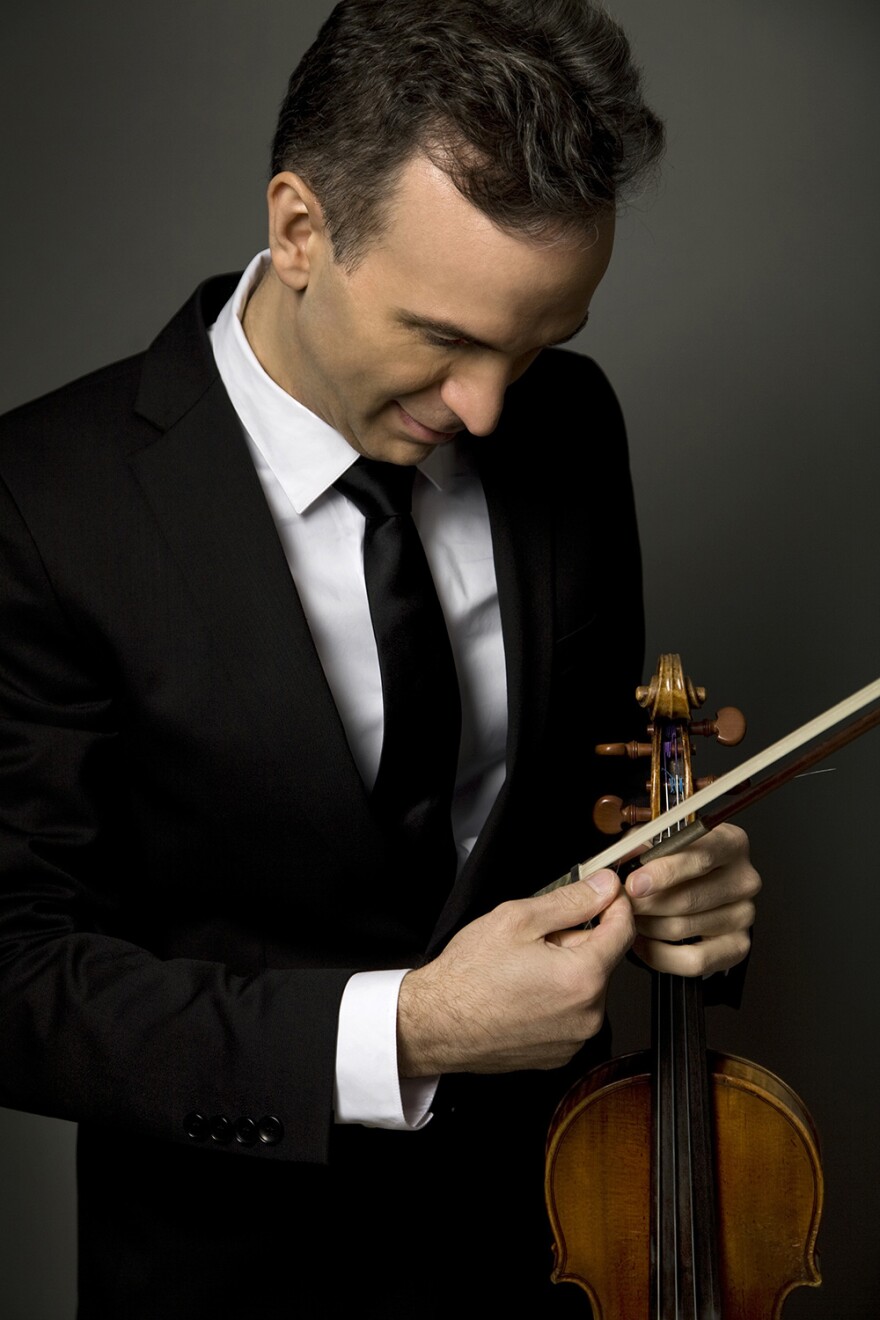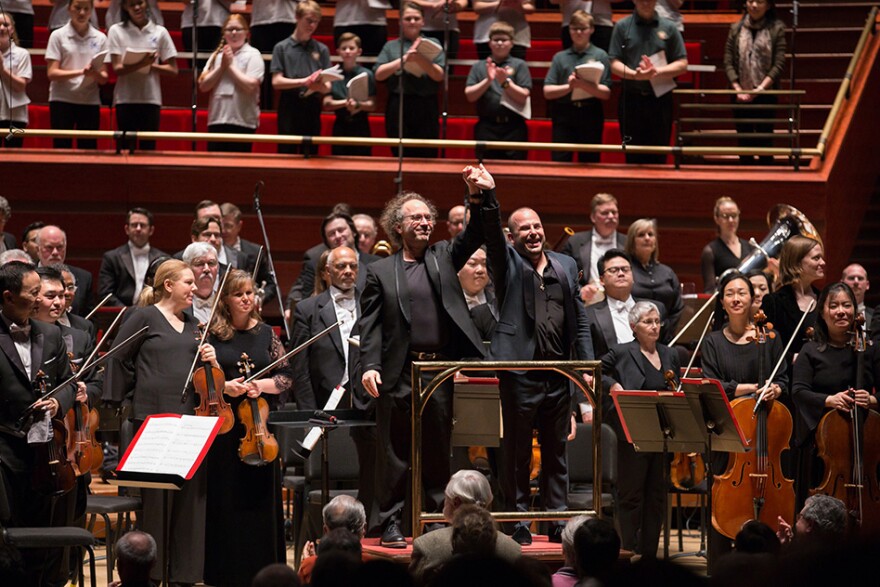As we approach the anniversary of what would be his 100th birthday on August 25th, we're celebrating Leonard Bernstein. Some classical stars of today share their thoughts below on Bernstein's extraordinary influence on their lives and the music world.
Yannick Nézet-Séguin

The Philadelphia Orchestra's music director says he was a model for musicians today.
"He is for me and all around genius. He actually showed us the way that we all try to do now, which is to be the complete musician—engaged socially, blurring the lines between what is so called popular music, or serious music, vocal music, instrumental music, chamber music— being a pianist himself but also a great conductor, a man of the world, present in all the crucial moments in the world ... Bernstein has always been one of my favorite conductors but more and more, I realize he is an inspiration in his way of living the music."
JoAnn Falletta
Music director of the Buffalo Philharmonic Orchestra and Virginia Symphony Orchestra, conductor JoAnn Falletta's strong memories of Bernstein date back to when she was a student at Juillard.

"To any American musician, Leonard Bernstein was a brilliant icon of excellence - a great composer, conductor, pianist and educator. Lauded all over the world, this child of Russian Jewish immigrants brought Mahler back to Vienna and made his music a staple of concert repertoire everywhere. When the Berlin wall came down, Bernstein was the obvious choice to celebrate the renewed brotherhood of man through Beethoven's Ninth Symphony- he seemed to many to be the absolute embodiment of hope, and the greatest chance that music could change the world for the better.
As a student at Juilliard, I found him overwhelming, terrifying and wonderful. When he entered our orchestra rehearsal room, the very atmosphere crackled with energy and the force of his personality.
Smaller in stature than he appeared when astride the podium, his leonine head and astonishing beauty lent him a strength and gravitas that were his alone. Yet he was kindness itself to myself and the other young conductors, ignoring technical mistakes and teaching us what music was really about- emotion, passion, and humanity.
He insisted we put ourselves into the music. When discussing Bizet's Carmen, for instance, he spoke with great drama of the intense sun beating down on the bullring, the smell of the blood on the sand, the roaring of the huge crowd, the danger, the fear, the emotional intensity of the music. As a parting gift, at the end of the lesson he would conduct our young conductors' orchestra in Mahler - music the student musicians had never played - and led them through difficult symphonies through the force of his musical personality, willing them to play well, and they did.
I will never forget his personal commitment to total immersion in music, and he continues to be a guiding star in my artistic life.
Gil Shaham
Violinist Gil Shaham was very young when he met Bernstein. Here he talks about that meeting, and the tremendous influence Bernstein has had on so many of today's classical musicians.

"I'm sorry to say I only met him once. I wish I had more time to meet him and have more memories, but I do cherish the one time I heard him perform... I think it was the Vienna Philharmonic at Carnegie Hall. It was an amazing concert and I got to meet him backstage. I was very young , maybe 12. But what's amazing to me is his legacy, because as I have traveled around the world and met musicians, literally hundreds of musicians that I know, started, were inspired, were motivated by Leonard Bernstein.
That's really something very special. Obviously a brilliant composer, musician, conductor, a great genius, but it's amazing to see the effect he had on others. I got to meet many many people who devoted themselves to music, at least in part, because of Leonard Bernstein."
Bramwell Tovey

The conductor, composer, and pianist is music director of The Vancouver Symphony Orchestra. When he guest-conducted The Philadelphia Orchestra in a program that featured Bernstein's Symphonic Dances and Tovey's composition, "Songs of the Paradise Salon" from his opera, The Inventor, he talked about Leonard Bernstein's great influence on him. Bernstein, he says, empowered him to be the conductor and composer he is today:
"In 1986 I was asked to [fill in] at the London Symphony Orchestra's Bernstein festival. I met the great man. He came to my rehearsals. I spent some time with him. He invited me to Tanglewood. They were the most incredible days of my youth, musically, because I never thought I would meet him. That basically launched my conducting career.
He was extremely kind to me, very supportive, and it had an enormous effect on the way I thought about music and the way I really developed as a composer. He knew I played the piano and improvised and he gave me a lot of encouragement to go with that side of my personality, which I had really subsumed because people thought, you just have to be a conductor, you can't be interested in things like that, the composing side of things.
And to be uninhibited as a conductor. He was all for removing artifice in music. It was all for the direct, almost the confrontational side of conducting. In a sense, I think if I hadn't met him, I don't know if I would have arrived at this place doing all these three things in my life. I really think I owe it to him."
Joshua Bell
The violinist never met Bernstein, but he still feels as if he knows him.

"I always loved Bernstein's music. I never got to meet him, so that was one of my great regrets. I never was assertive enough to go up and meet him. We crossed paths at Tanglewood; he came to Indiana University when I was in my early 20's, so I could have and should have met him, but I feel like I know him from all his lectures and his music. What a personality!"
"Back In 2001, I did a recording called "West Side Story Suite." I worked with Bill Braun on creating a West Side Story arrangement for violin and orchestra. Incredible music. And I play often, and this year in particular, because of the centeniary, I play his Serenade for Violin, Strings and Percussion. He was a force of nature and one of the most important musicians of the 20th century."
Andreas Delfs

Temple University Symphony Orchestra's artistic director shared some wonderful memories of time spent with Bernstein when Delfs was a student at Juillard.
"I was extremely blessed to have known and worked with Leonard Bernstein myself. At the time, I was a student at Juillard; he lived basically across the street in the Dakota. Whenever he felt like it, he would show up. And if the orchestra was available, we would do something, we would work on something. It ranged from working on arias from Carmen, which he had just recorded, to doing music by Aaron Copeland (you know, Copeland and Bernstein were very close) or just going to his apartment to sit around and talk about music.
He loved to teach and preach. I think, Bernstein at heart, was a rabbi. He loved to preach, and he loved to sit with young people and share his wisdom. And he would take us out to concerts, take us out to dinner. It was a wonderful tme and a wonderful memory. Actually the former dean of students at Juilliard emptied out his basement and found some old photographs of me and Bernstein that he sent me, and I was so happy to get those because I didn't have a single photograph of that great master and me.
Jean-Yves Thibaudet

The concert pianist who played Bernstein's Age of Anxiety with The Philadelphia Orchestra in Philadelphia and on tour in 2018, hears Bernstein's sense of humor in his music.
"I never met him—very, very sadly. But, I've worked with lots of people who were close to him. From what they told me, he loved to tell stories, jokes. So I can sometimes hear in the music—here, he's telling us a little joke. It's fascinating. How can one human being have so much talent and give so much. He must have been an incredible person to be near to."
Jeffrey Siegel
The pianist, who performs and tells stories about music in his "Keyboard Conversation" concert series, says Leonard Bernstein was a big influence; he recalls how Bernstein once told him just how important music education is—for any age.
"Leonard Bernstein was really the great influence for me; what he was able to with the Young People concerts, with the Norton lectures, to make listening to music a more postive experience. He did it incomparably.

The last time I saw Mr Bernstein, it was just the two of us in a room, and he was teasing me a bit. 'I've heard about your Keyboard Conversations, Jeffrey, why do you talk about music? And if you're going to talk about the Moonlight Sonata, what would you say?'
So I gave him my spiel; as I'm telling him what I do, the smile on his face was getting larger and larger. Finally he stopped me and embraced me and said, 'Jeffrey, I know where you got this idea!'
[At the time] I was doing a week of concerts as Zubin Mehta's soloist with the New York Philharmonic, and Mr. Bernstein said, 'I know it's great being here, in white tie and tails, being Zubin's soloist, with the Philharmonic at Lincoln Center. And he pointed at me: and said 'These keyboard conversations are the most important work you are doing!' "
Tod Machover
The composer and MIT professor, whose work Philadelphia Voices for choirs and orchestra was premiered by The Philadelphia Orchestra in 2018, reflected on Bernstein's influence on him.

"My mom was a pianist and required us to watch the Young People's Concerts. I grew up in New York when Leonard Bernstein was at The Philharmonic. So I think, for me, watching the Young People's Concerts and everything about Leonard Bernstein was a story of being incredibly influenced by it and not knowing it at the time. There's never been a pedagogue like that ever since.
So many things I take for granted for myself now. The fact that you can talk about the Beatles and Bach and Bartok in one phrase, and it's not slumming to talk about the Beatles as music that means something to people. Leonard Bernstein was the first person to do that and a lot of people didin't take him seriously, but he was right about that.
I went to Paris to work with [Pierre] Boulez when I was 21. The longer I was in Paris, the more I realized that my heart was with the kind of thing Bernstein was doing. I realized that the American idea—that the expression, the emotion, the human story— is what matters. I think, over the years, I realized how much I had gotten from Bernstein, and how much my heart is in what he was doing."
This week only, when you contribute to WRTI at the $365 gift level, we'll thank you with This is Leonard Bernstein: His Greatest Recordings, a 16-CD special edition of Bernstein's American Columbia recordings from the 1950s and 1960s. (This is an unprecedented offer on a superb CD set that lasts only until 6 pm on Saturday.) Contribute now!


